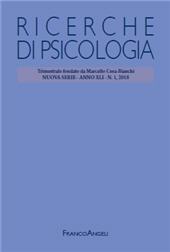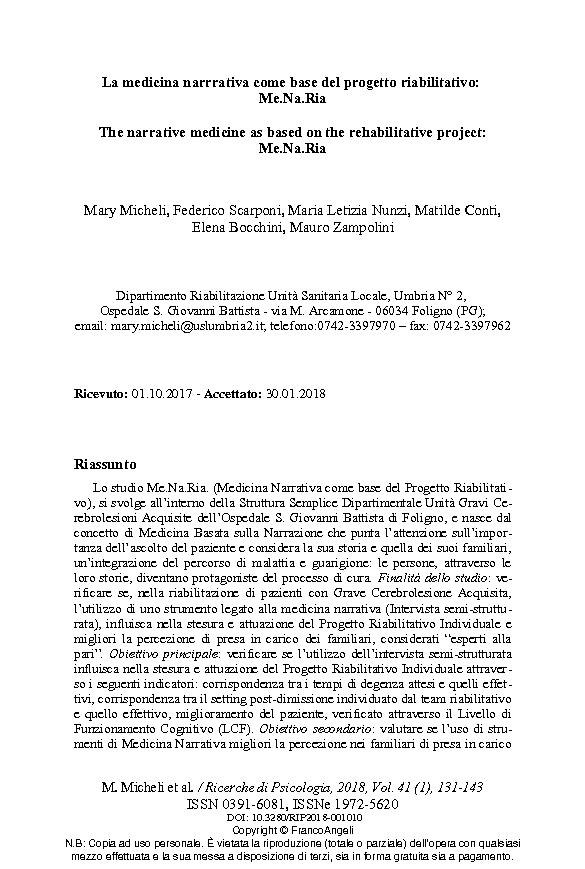La medicina narrrativa come base del progetto riabilitativo : Me.Na.Ria.
131-143 p.
Lo studio Me.Na.Ria. (Medicina Narrativa come base del Progetto Riabilitativo), si svolge all'interno della Struttura Semplice Dipartimentale Unità Gravi Cerebrolesioni Acquisite dell'Ospedale S. Giovanni Battista di Foligno, e nasce dal concetto di Medicina Basata sulla Narrazione che punta l'attenzione sull'importanza dell'ascolto del paziente e considera la sua storia e quella dei suoi familiari, un'integrazione del percorso di malattia e guarigione: le persone, attraverso le loro storie, diventano protagoniste del processo di cura. Finalità dello studio: verificare se, nella riabilitazione di pazienti con Grave Cerebrolesione Acquisita, l'utilizzo di uno strumento legato alla medicina narrativa (Intervista semi-strutturata), influisca nella stesura e attuazione del Progetto Riabilitativo Individuale e migliori la percezione di presa in carico dei familiari, considerati "esperti alla pari".
Obiettivo principale: verificare se l'utilizzo dell'intervista semi-strutturata influisca nella stesura e attuazione del Progetto Riabilitativo Individuale attraverso i seguenti indicatori: corrispondenza tra i tempi di degenza attesi e quelli effettivi, corrispondenza tra il setting post-dimissione individuato dal team riabilitativo e quello effettivo, miglioramento del paziente, verificato attraverso il Livello di Funzionamento Cognitivo (LCF). Obiettivo secondario: valutare se l'uso di strumenti di Medicina Narrativa migliori la percezione nei familiari di presa in carico dei propri bisogni e la diminuzione dello stress (Caregiver Need Assestement (CNA) somministrato all'ingresso e alla dimissione). I primi risultati ancora parziali (il numero esiguo non ha permesso un'analisi statisticamente significativa), confermano un miglioramento nella percezione nei familiari di presa in carico dei propri bisogni.
Attraverso l'approccio narrativo è stato possibile individuare il "funzionamento" della persona e della famiglia, i desideri e le aspettative per permettere una presa in carico globale. Accogliere i bisogni dei familiari, significa anche rafforzare le risorse e le strutture della famiglia così da permettere il rientro a domicilio della persona anche con grave disabilità. [Testo dell'editore].
The Me.Na.Ria. study (Narrative Medicine as the basis of the Rehabilitation Project) born in February 2016 within the GCA Department's Simple Hospital Structure in Foligno (USLUmbria2), and originates from the Narrative-based Medicine's concept, which emphasizes the importance of listening to the patient, and furthermore considers essential the emerging personal stories from both pa-tients and families. This process is considered to be the path of integration among illness and healing: People, through their stories, become the protagonists of the cure process. Purpose of the study: to verify whether the use of a narrative medicine tool (Semi-structured interviews), throughout the rehabilitation of patients with Severe Acquired Brain Injury (GCA), can influence the design and implementation of the Individual Rehabilitation Project, and besides improves the perception of taking care of family members considered as "peer experts".
Main aim: to verify whether the use of Semi-structured interviews influence the PRI writing and implementation through the following indicators: correspondence between expected and actual hospitality times, correspondence between the post-discharge setting identified by the rehabilitation team and the actual team, improvement of the patient's Cognitive Operation Level (LCF). Second aim: to assess whether the use of narrative medicine tools improve familial perception needs and stress reduction (Caregiver Need Assessment (CNA) administered at the entrance and discharge). The first partial results have confirmed how the narrative approach can be considered as a utility process for the person best cure and rehabilitation; identifies the "functioning" of the person and family as well as the desires and expectations allowing an appropriate taking care of the person.
Therefore, the importance to address the needs of family members by strengthening the resources and facilities of the family is crucial, so that the person can return home even with severe disabilities. [Publishers' text].
Ist Teil von
Ricerche di psicologia : 1, 2018-
Artikel aus derselben Ausgabe (einzeln erhältlich)
-
Informationen
ISSN: 1972-5620
KEYWORDS
- Riabilitazione, Medicina Narrativa, Caregiver, Progetto Riabilitativo Individuale, Grave Cerebrolesione Acquisita
- Rehabilitation, Narrative Medicine, Caregiver, Individual Rehabili-tative Project, Severe Acquired Brain Injury



